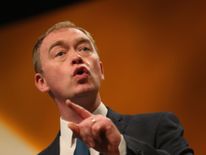Theresa May is said to be planning to allow a new wave of grammar schools for the first time in 20 years.
A government source suggested bringing back academic selection in state schools would be part of her agenda to increase social mobility.
But lifting the ban on new grammar schools, imposed by Labour in 1998, would be highly controversial and put her on a collision course with the teaching establishment.
Mrs May attended a grammar school and recently allowed a new "annex" for one in her Maidenhead constituency, which is permitted within the law.
The green light for a new generation of grammars, which now account for just 163 of the 3,000 state secondaries in England, would cheer Tory backbenchers who failed to win David Cameron's backing.
Downing Street said: "The Prime Minister has been clear that we need to build a country that works for everyone, not just the privileged few.
"Every child should be allowed to rise as far as their talents will take them and birth should never be a barrier.
"Policies on education will be set out in due course."
A government source told The Sunday Telegraph that grammars were about "social mobility and making sure that people have the opportunity to capitalise on all of their talents".
Education Secretary Justine Greening has said she is 'open' to reversing the ban
The report suggests an announcement may be made at the party conference in October.
Mr Cameron dropped the Conservative party's commitment to bringing back grammars in 2007 - accusing his party of "clinging to outdated mantras".
He said at the time that parents "don't want children divided into successes and failures at age 11".
He and his education secretary Michael Gove instead put their energies into expanding academies and free schools, which do not select by ability but are free from local authority control.
But Mrs May's education secretary Justine Greening said she was "open-minded" about allowing new grammar schools.
State-educated Miss Greening said the education system had changed "dramatically" from the "binary" choice between grammars and secondary modern schools of decades past.
Her comments fuelled speculation that the new administration may change its policy by allowing some free schools and academies to introduce academic selection.
Lib Dem leader Tim Farron has vowed his party will work to block the move
Graham Brady MP, the chairman of the 1922 committee of Tory backbenchers, is a powerful supporter of grammar schools, who says they would "restore the ladder that used to take so many of us from modest backgrounds to the best universities and beyond".
But there are also strong opponents within the Tory party.
Ryan Shorthouse, of the Bright Blue think-tank of Tory modernisers recently said grammar schools are "not engines of social mobility" as only 3% of entrants are eligible for free schools meals, compared to an average of 18% of the children in these areas.
Ofsted chief Sir Michael Wilshaw has said bringing back grammars would be a "disaster" and warned that they make nearby schools worse.
Reversing the ban would require a change in the law, which could come this autumn with a new schools bill.
There would be strong opposition from other parties.
Labour's former shadow education secretary Lucy Powell said re-introducing grammar schools would be an "incredibly backward step".
She said: "All the evidence tells us that, far from giving working class kids chances, they entrench advantage and have become the preserve of the privately-tutored."
Liberal Democrat leader Tim Farron said his party "will work to block any Tory attempt to create grammar schools" - which his party could do in the House of Lords where the Tories lack a majority.




No comments:
Post a Comment